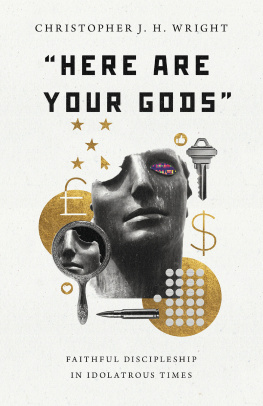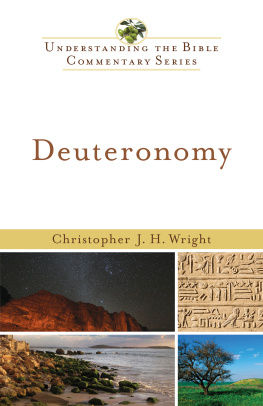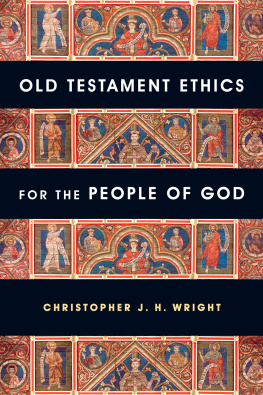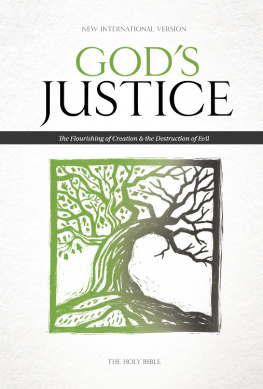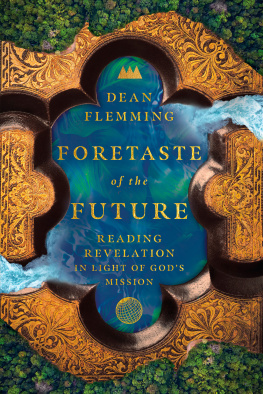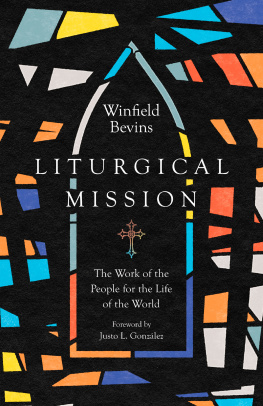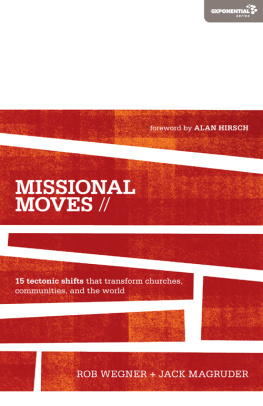14

God and the Nations in Old Testament Vision
T he nations of humanity preoccupy the biblical narrative from beginning to end. When they are not in the foreground, they are there in the background. When they are not the subject of great international events, they are the object of divine inspection or accusation. When they are not the direct focus of Gods attention, they remain the surrounding context (for good or ill) of the life of Gods people. The obvious reason for this is that the Bible is, of course, preoccupied with the relationship between God and humanity, and humanity exists in nations. And where the Bible focuses especially on the people of God, that people necessarily lives in history in the midst of the nations. It is clear that Israel as a light to the nations is no peripheral theme within the canonical process. The nations are the matrix of Israels life, the raison dtre of her very existence.
The nations first appear in the biblical grand narrative in the context of life after the floodGods catastrophic judgment on human wickedness. By Genesis 11 the nations have been scattered in confusion. The conflict of nations mirrors the brokenness of humanity as a whole. With undoubtedly deliberate intent, the final book of the Bible comes to its climax with the picture of the nations purged of all sin, walking in the light of God, bringing their wealth and splendor into the city of God, contributing their redeemed glory and honor to the glory and honor of the Lamb of God (Rev 21:24-27). The brokenness of humanity is healed at the river and tree of life (Rev 22:1-2). And between these two great scenes in Genesis and Revelationthe primal and the ultimate state of the nationsthe Bible records the story of how such cosmic transformation will have been accomplished. It is, in short, the mission of God as we have been seeking to elucidate in the preceding chapters. Gods mission is what fills the gap between the scattering of the nations in Genesis 11 and the healing of the nations in Revelation 22. It is Gods mission in relation to the nations, arguably more than any other single theme, that provides the key that unlocks the biblical grand narrative.
In these final two chapters (14-15) we will survey that great sweep of biblical teaching and expectation, since it lies at the heart of a fully biblical understanding of mission. We will note how the nations were portrayed in the Old Testament as witness of all that God was doing in, for or to Israel. Then we will observe that the expectation of Israels faith and worship (if not always the outcome of their practice) was that the nations would come to benefit from that history of salvation and give thanks for it. This means that the nations would eventually acknowledge and worship Israels God, YHWH , with all the concomitant responsibilities and blessings of such worship. More remarkably yet, there were voices and visions within the Old Testament that looked for the day when nations would be included within Israel in such a way that the very word Israel would be radically extended and redefined. All of this constituted the horizon of mission to the nations in the New Testament and provided the strong scriptural justification for such mission for those who engaged in it.
Before embarking on the survey just outlined, however, we need to begin by rehearsing some of the basic affirmations that the Old Testament makes about the nations in general in relation to Gods creative intention and Gods governance of history. For this is the platform or stage on which the historical outworking of Gods redemptive mission to the nations takes place.
The Nations in Creation and Providence
Nations are part of created and redeemed humanity. Although we first meet the nations in the context of the fallenness and arrogance of humanity even after the flood, the Bible does not imply that ethnic or national diversity is in itself sinful or the product of the Falleven if the deleterious effects of strife among nations certainly are. Rather, nations are simply there as a given part of the human race as God created it to be. Gods rule over the nations, amply affirmed throughout the Old Testament, is simply a function of the fact that he created them in the first place. Speaking as a Jew to Gentiles in an evangelistic context, Paul takes for granted the diversity of nations within the unity of humanity and attributes it to the Creator and to his world-governing providence. From one man he made every nation of men, that they should inhabit the whole earth; and he determined the times set for them and the exact places where they should live (Acts 17:26).
Although Paul goes on to quote from Greek writers, his language in this verse is drawn from the Old Testament, from the ancient song of Moses in Deuteronomy 32:
When the Most High gave the nations their inheritance,
when he divided all mankind,
he set up boundaries for the peoples. (Deut 32:8)
National distinctives, then, are part of the kaleidoscopic diversity of creation at the human level, analogous to the wonderful prodigality of biodiversity at every other level of Gods creation.
Furthermore, the eschatological vision of redeemed humanity in the new creation points to the same truth. The inhabitants of the new creation are not portrayed as a homogenized mass or as a single global culture. Rather they will display the continuing glorious diversity of the human race through history: People of every tribe and language and people and nation will bring their wealth and their praises into the city of God (Rev 7:9; 21:24-26). The image we might prefer for the Bibles portrait of the nations is not a melting pot (in which all differences are blended together into a single alloy) but a salad bowl (in which all ingredients preserve their distinctive color, texture and taste). The new creation will preserve the rich diversity of the original creation, but purged of the sin-laden effects of the Fall. Or, the mission of God is not merely the salvation of innumerable souls but specifically the healing of the nations.
The creational given of ethnic diversity and the eschatological vision of all races, languages and cultures being included in redeemed humanity both speak volumes to the sin and scandal of racism. This is not an issue we can pursue here, but it is certainly a vital task of mission to challenge this particular dimension of our fallenness, for it is clear in the New Testament that the gospel radically undermines any racial or racist assumptions in relation to our standing before God.
All nations stand under Gods judgment. For those of us who have absorbed a predominantly individualistic way of thinking about life, faith and our relationship with God, one of the more difficult biblical concepts to get our minds around is the idea that God can and does deal with nations as wholes. Yet the Bible unquestionably affirms it, and not only affirms it but illustrates it in graphic detail over long stretches of history. From the book of Exodus onward, nations play their part in the biblical narrative, and the opening story becomes somewhat paradigmatic. The battle between YHWH and the Pharaoh is not just between God and one recalcitrant individual; the whole nation of Egypt is implicated in the sin of oppression and suffers in the process of Gods liberating justice.
The narrative goes on to show how successive nations either set themselves against YHWH and his people out of their own malicious initiative (e.g., the Amalekites, Moabites, Amorites) or have become so incorrigibly wicked that they are to be destroyed in the execution of Gods punishment (the Canaanite nations). Thus, while Israel is warned against arrogantly imagining that their victory over the Canaanites will be on account of their own righteousness, God confirms that it



